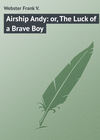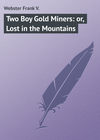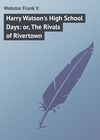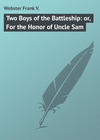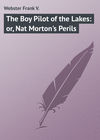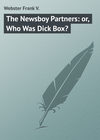Kitabı oku: «Airship Andy: or, The Luck of a Brave Boy», sayfa 7
CHAPTER XIX – A DISAPPOINTMENT
Andy was led into the office of the jail and up to the desk of the official who had registered his name the day before. This man opened a drawer and pushed a package before Andy and a receipt.
“See if your money is all right,” he directed, “and sign that receipt.”
“Going to give them back to me, are you?” said Andy brightly, feeling delighted at recovering his liberty. “They must have found out that I am innocent.”
“H-m! that’s to be determined later on.”
Andy looked questioningly about the room. Who had set him free? What did it mean? Just then he caught the sound of voices in another room and the officer pointed to it.
“Your friend is in there,” he said. “He’s waiting for you.”
Andy felt as if he had wings on his feet. His heart was overflowing with gladness. He crossed the threshold of the doorway the officer had indicated, looked in, and then stood stock still, very much surprised.
“Well, young man, we’ve reached you at last?” spoke a hearty voice.
“Why, it’s Mr. Webb!” exclaimed Andy.
He had at once recognized the gentleman whom he had driven over in the automobile from Princeville to Macon, the day when all his troubles in life seemed to have begun.
With Mr. Webb was a man who nodded pleasantly but curiously to Andy. This was Joshua Bird. He was reported to be the richest man in Princeville, and dealt principally in real estate and had the reputation of being something of a miser.
Mr. Webb, holding Andy’s hand, turned to Mr. Bird.
“Well, sir, everything is satisfactory?” he asked.
“Entirely so,” answered Bird. “You’re putting a good deal of faith in a lad you scarcely know, though.”
“I’ll bank on my confidence,” answered Mr. Webb. “Nelson, you remember me, do you not?”
“Perfectly, sir, but I don’t understand.”
“My being here?” questioned Mr. Webb. “A purely selfish motive is at the bottom of it, I am free to confess, although I am glad to be of service to you on general principles. Are you ready to leave here at once?”
“Where for, sir?”
“An automobile dash across the country.”
“And then am I to return here?”
“Not until your trial comes on. Let me explain, so you will understand the situation. I have gone on your bail bond.”
“I don’t know how to thank you,” said Andy gratefully.
“Your friend, Mr. Parks, found me late last night at Greenville, where Mr. West and myself were anxiously awaiting you. He explained about your arrest, and told us the whole story of your affairs. It seems that your trouble began with the finding of my pocketbook. It was only right, therefore, that I should stand by you – which I have done, and intend to keep up, Andy, for you have proven yourself a good, honest boy.”
“Thank you, Mr. Webb,” said our hero with considerable emotion.
“Mr. West, my legal adviser, arranged with Mr. Bird, who has just left us. The signing of your bail bond is the result. You are free to get to those anxious friends of yours at the aviation meet, but first I want you to take a little trip with me.”
“After that old leather pocketbook, I suppose.”
“You’ve guessed it right, Andy.”
“I would like to speak with a good friend of mine in the jail here for a moment,” said Andy, “and then I will be ready to go with you.”
“All right, Andy.”
Chase had already heard the good news and congratulated Andy, chuckling and hobbling about at a great rate.
“Remember you’re to look out for a new job for me,” he intimated.
“I’ll attend to that all right, Mr. Chase,” promised Andy. “If things go as I think they will, I have a friend as well as an employer who will probably need a man such as you to potter about and look after things.”
“Andy, I’ll potter for keeps if you get me that situation,” declared the old lockup-keeper earnestly. “You get it fixed for me, and when your trial comes up, I’ll show you how much I think of you.”
“Things are certainly coming out famously right,” chirped Andy gaily, as he left Chase.
“Now then, Nelson, take a try at my new machine,” said Mr. Webb, as he led Andy to the street.
Seth Talbot, one of his own machines waiting at the curb for a fare, was strolling around inspecting the beautiful touring car which Mr. Webb had indicated.
“Eh, hey! what’s this?” he blubbered out, as Andy walked smartly to the machine and leaped into the driver’s seat.
An officer who was aware of the situation nudged Talbot and spoke a few quick words to him in an undertone. The face of the garage owner turned white with astonishment and malice. Mr. Webb had noticed him, and asked Andy:
“Who is that man?”
“Mr. Talbot, my old employer,” responded Andy.
“I don’t like his looks,” spoke Mr. Webb simply. “Now then, Nelson, of course you know where I want to go.”
“After the leather pocketbook – yes, sir.”
“I hope you can find it.”
“I feel sure we shall, sir. We will have to take some roundabout roads to get to the farm I told Mr. West about.”
“This is a very important matter to me,” explained Mr. Webb. “I may as well tell you, Nelson, that the fortune and happiness of two orphan children, distant relatives of mine, depend on the finding of that old pocketbook.”
“I am very much interested, Mr. Webb,” said Andy.
“You did not notice perhaps, but glued down in the big part of that pocketbook is a thin compartment. Secreted in that is an old time-worn sheet of paper that I spent thousands of dollars and a year’s time in locating and getting into my possession. I was on my way to my lawyer with it, and had placed two hundred dollars in the pocketbook for costs in the law suit, when I lost the pocketbook, as you know.”
“I never dreamed there was any value in the old pocketbook,” said Andy. “I knew it was in my old clothes which I threw away at a farm near Wade, I told you about. I remember perfectly well tossing them up on an old shelf. Unless they have been disturbed, we will find the clothes and the pocketbook. It was a regular old rubbish pile where I tossed them, and out of anybody’s way.”
“I shall feel immensely relieved and glad when I find that document,” declared Mr. Webb, with a sigh of anxiety.
John Parks was responsible for bringing the word to Mr. West that had sent Mr. Webb to Princeville. The aeronaut had told the lawyer considerable about Andy and the approaching airship race, and as they rolled along Mr. Webb showed a great deal of interest in Andy’s aviation ambitions and asked a great many questions.
“I shall want to see you again as soon as I get that document in the pocketbook to the lawyers,” said the gentleman. “The airship race is to-morrow?”
“Yes, sir.”
“I will keep track of you through Mr. Parks, and probably meet you day after to-morrow. I hope you win the race, Nelson, and get the prize. You deserve it, my boy. If you fail, do not get discouraged. You have some good friends, and I am one of them.”
“You have shown that,” said Andy with feeling. “I wouldn’t have missed the race for a good deal.”
Andy entertained his companion considerably by a recital of his adventures three weeks previously when he had helped the goose farmer get his product to market.
“Just yonder is where I met him first,” explained Andy, as they passed over a bridge crossing the river. “It’s a straight road to the Collins farm now, but not very even.”
“I hope we find things as you expect,” said Mr. Webb.
“I think we will,” answered Andy cheerfully.
It was about an hour later when they rounded a curve in a beautiful country road.
“Just beyond that grove of trees,” said Andy, “and we come in full view of the Collins farmhouse. Now we can see it – Why, I – don’t – understand – this.”
Andy slowed down in speech, with a series of wondering gasps, as he likewise slowed down the machine.
“Why, what’s the matter, Nelson?” queried Mr. Webb.
“Don’t you see?” began Andy. “No, you don’t see, and that’s just it. There’s something wrong. The farmhouse did stand right over where that gravelled road runs into the farm, and now – ”
“Nelson,” interrupted Mr. Webb almost sharply, “there has been a fire here.”
Andy stared dubiously, but in great concern. There could be no doubt of it, this was the site of the Collins’ farm. There were the white-washed posts where the farm road began, the horse block where he bade the goose farmer good-by, but the farmhouse itself had disappeared.
CHAPTER XX – A NEW CAPTIVITY
“Nelson, could you possibly be mistaken?”
“No, sir, positively not.”
Andy had come to a dead stop with the automobile. He stared blankly at the prospect before them. The site of the Collins farmhouse was a flat stretch of waste and ruin. Grass, weeds, trees, fences showed the ravages of a great fire.
Mr. Webb looked dreadfully disappointed. His face had become almost pale. Andy shared his disquietude, but he could simply say:
“I am very sorry.”
“You did all you could, Nelson,” responded his companion. “Here comes some one. We will question him a little.”
A farm laborer with a hoe across his shoulder sauntered down the road. Andy hailed him. As he came nearer to them Mr. Webb said:
“My man, what has been happening around here?”
“Don’t you see?” queried the man, with a comprehensive wave of his hand across the bleak ruins. “Fire.”
“This is the Collins farm, isn’t it?”
“It was,” answered the man. “The fire took them in the night a week ago.”
“And burned everything about the place?”
“Down to the pig styes.”
“Where are the Collins people?”
“Gone over into Bowen County until they can arrange to build again.”
“Start up, Nelson,” ordered Mr. Webb. “It’s a waste of time to loiter around here.”
Mr. Webb felt cruelly disappointed. Andy saw this and was sorry for him. He glanced at the spot where he remembered the old shed to have stood. Even the tree that had sheltered it had burned to a crisp.
“Where am I to go?” inquired Andy.
“You had better strike for Rushville,” replied Mr. Webb. “From what I remember, you can get a train to Montrose earlier than on the Central.”
“I am to go on to John Parks?”
“That’s the programme,” said Mr. Webb, trying to appear cheerful; “why not?”
Andy reflected seriously for a moment or two. Finally he spoke:
“Mr. Webb,” he said; “I hardly feel right to leave you on my bond for that big amount. Something might happen so that I could not appear for trial – trickery, or a dozen things.”
“And because you have not succeeded in recovering that pocketbook, you suppose I’m going to desert you, Nelson?” inquired the gentleman.
“You are not the man to do a single mean thing,” replied Andy, “but, with all your troubles, and me being a stranger – ”
“Drop it, Nelson. You have tried to be the best friend in the world to me, and I’d go on your bond for double the amount I have. You are to go straight on to Montrose, win that airship race, and when you have got that off your mind we will have a talk together.”
“You are a good, kind man,” said Andy, with fervor, “and I’d walk barefooted on hot coals to get you back that pocketbook.”
When they reached Rushville, Mr. Webb took charge of the automobile. He made many encouraging references to the coming airship race, and when he left Andy at the railroad station shook his hand in a friendly way.
Andy made a disappointing discovery as soon as he consulted the train schedules. A change in the service of the road had been made only that week, and there was no train south until seven o’clock. It was now three, and he would have to wait four hours.
“I won’t be able to get home until after dark,” reflected the lad. “I hoped to have an hour or two of daylight for practice, but this knocks my plans awry. Well, as it is, this is a good deal better than missing the race altogether.”
It was quite dark when the train reached the limits of Montrose. It stopped at a crossing, and Andy got off and made a short cut for the Parks camp.
His course led him past the large aviation field. Andy was anxious to report to Mr. Parks as soon as possible, but unusual light and animation about the big enclosure aroused his curiosity and interest, and he passed the gate and strolled by the various aerodromes.
Everything was “the race!” Groups were discussing it, contestants were oiling up their machines and exploiting the merits of the others. An hour passed by before Andy realized it. He came to halt in front of the last tent in the row, turned to retrace his steps, and then suddenly halted.
“I’d like to know what the Duske crowd is about,” he reflected, glancing towards the isolated camp which he had surreptitiously visited only a few nights previous. “Mr. Parks might be glad to know, too. I’ll do a little skirmishing and find out what I can.”
Andy crossed a dark space. Lights were moving about the Duske camp, and these served as a guide. He neared the fence surrounding the camp, got over it, and cautiously approached the large tent which held the airship he had inspected on his first stealthy visit to the place.
Suddenly Andy tripped and fell. His foot had caught in a wire stretched taut under the grass. As he went headlong across the grass, a bell began to jingle, and he realized that the wire was one of many probably set to trap intruders. At all events, before he could get to his feet two men ran out of the tent.
One of these was Duske. The other was his companion of the evening when Andy had previously visited the place. They pounced on him promptly.
“Another spy,” spoke Duske, dragging the captive toward the tent.
“They’re getting thick,” observed his companion. “Those fellows at the big camp are mighty curious to pry into the secrets of our craft here. Hello! why, Duske, this is the same fellow we caught snooping around here three nights since.”
“Eh? Oh, it’s you again, is it?”
They had come inside the tent. The light burning there revealed Andy fully. Without letting go of him Duske scowlingly surveyed his captive.
“Say, Duske,” spoke the other man quickly, “it’s Parks’ boy, and he’s the one who won the pony prize.”
“Was that you?” demanded Duske; “are you Andy Nelson?”
“Suppose so?” queried Andy.
“Then you’re the fellow who is going to take Parks’ place in the race to-morrow?”
“I guess that is right,” affirmed Andy.
“No,” cried Duske, showing his teeth, and looking fierce and malicious, “it’s wrong, dead wrong, as you’re going to find out. Fetch me some rope.”
“Hold on,” objected Andy, “you aren’t going to tie me up?”
He put up a manful struggle and very nearly got away. The two powerful men were more than his equal, however, and in a very few minutes Andy found himself tied hand and foot.
Duske and his companion carried him bodily along through the tent, past the flying machine, and threw him onto a mattress lying on the ground in a small compartment partitioned off with canvas. Duske tested the ropes that bound Andy, gave them another twist, and went out into the main tent.
“This looks like luck,” observed the companion of Duske.
“Yes, if we’ve got the bearings right,” replied the other, “Are you sure he was scheduled to take Parks’ place in the race?”
“Of course I am. Hasn’t Tyrrell told us already about his getting into trouble somewhere, and couldn’t be here to make the race? Hasn’t Parks hired Tyrrell in his place?”
“Then how comes the boy to be here? I don’t like the looks of things at all.”
“Tyrrell will be here before long. He can post us if there is any break in our arrangements.”
The two men passed out of hearing. Andy made one or two efforts to loosen his bonds, found them unusually secure, and gave up the experiment. What his captors had said startled and disturbed him considerably.
“Mr. Parks doesn’t expect me to show up in time to make the race, and this man they talked about, Tyrrell, is going to take my place,” reflected Andy. “He is a friend of the people here, and that certainly means harm for Mr. Parks.”
Andy worried himself a good deal during the next hour, imagining all kinds of plots on the part of Duske and his friends to prevent the Racing Star from winning the prize.
Finally Andy heard voices in the large tent. His name was spoken, and he listened intently to catch what was said.
“If that’s so, and it’s really Andy Nelson,” sounded a new voice, “it’s funny, for up to this morning he was in jail at Princeville.”
“Then he’s escaped, or got free somehow,” answered Duske. “He’s that boy of Parks’ who was the winner in the dash for the pony prize.”
“If he is,” came the reply, “you want to hold him a close prisoner till the big race is over.”
CHAPTER XXI – A FRIEND IN NEED
The voices that Andy heard died away in the distance. In about ten minutes, however, they came back again within his range of hearing. The man he believed to be Tyrrell, who in some way had induced Mr. Parks to accept him as a substitute for himself in the aviation race, was speaking to his companion, who was Duske.
“That’s the programme, is it?” he was asking.
“To a T.”
“You will look out for the Nelson boy.”
“Don’t fret on that score. We’ll cage him safe and sound until the race is over.”
“You think I had better use the bottle?”
“Yes, here it is. Stow it anywhere in your clothes.”
“Isn’t there some easier way? What’s the use of fire? It may strike investigators as suspicious.”
“Not at all. They tanked you too full, a spark did the mischief, see? You know enough to descend in among some trees?”
“Of course.”
“Let the flame singe your clothing, tell some sensational story of a hairbreadth escape, and you’ll be quite a hero.”
“You think with the Racing Star out of the way that your machine is bound to win, do you?”
“I know it,” affirmed Duske confidently. “Those other aeroplanes are mere botches. They will do as playthings, but as to distance, they’re not in it with the Moon Bird.”
“All right, I’ll follow instructions. Keep that boy safe. I’d better go. It would be all up with our scheme if Parks should suspect I was your friend.”
Andy fairly writhed where he lay. The plot of the villains was now perfectly clear to him. The man Tyrrell had wormed himself into the confidence of Mr. Parks, who little suspected that he was a confederate of Duske. Tyrrell was to make the start with the Racing Star, pretend that an accident had happened, and burn up the airship.
“What shall I do – what can I do?” breathed Andy. “They don’t intend to let me go until after the race is over to-morrow.”
In about an hour Duske and an old man who seemed to be the cook of the camp came to where Andy lay. Duske released one hand of the captive. The anxious prisoner did not feel much like eating, but he realized that he must keep up his strength. He ate some bread and meat which the cook brought, and drank some water.
Duske tied him up again, tighter than ever. Then he spoke to the cook:
“You get your armchair right outside the canvas flap here, Dobbins.”
“All right, Mr. Duske,” replied the man.
“Every fifteen minutes, right through till morning, you are to look in on that boy. See that he is comfortable, but particularly that he is safe.”
“I’ll attend to it.”
“If you let him get away, you’re out of a job, remember.”
The cook followed out the programme directed by Duske to the minutest detail. Andy had no opportunity to free himself – he was watched so closely. He decided that the effort would be futile. Until midnight he lay wide awake, nervous and worried. Then he made up his mind that it did no good to fret, and got some sleep.
He was given his breakfast about six o’clock in the morning. Then he was tied up again and left to himself. He lay on the mattress so that when the wind blew the canvas lifted and he could look out. He was faced away from the direction of the aviation field, however, and twenty feet away the fence stared him blankly in the face.
From sounds near by and in the distance during the next two hours, Andy could figure out just what was going on about him. The Moon Bird was carried from its aerodrome and taken to the aviation field. The old cook seemed to be left in possession of the camp. He looked in on Andy every so often. The rest of the time he was busy in the larger tent or outside of it with his cooking utensils.
Poor Andy was in sore straits of despair. He had a vivid imagination, and could fancy all that was shut out from his view by captivity. He heard a distant town bell strike nine o’clock.
“In an hour the airships will be off,” soliloquized the captive mournfully, “and I won’t be there.”
Andy pictured in his mind all that was going on at the aviation field. He could fancy the airships ranging in place for the start. He could imagine the animation and excitement permeating the groups of spectators. He shut his eyes and tried to forget it all, so keen was his disappointment.
He heard the band strike up a gay tune. Then a gun was fired. Andy almost shed tears. In twenty minutes the starting signal was due.
“They’ll have a head wind,” he ruminated, as the breeze lifted the canvas at the side of the mattress upon which he lay. “It will be light, though, and won’t hinder much;” and then he thrilled, as he fancied himself seated in the operator’s stand of the splendid Racing Star, awaiting the final word, “Go!”
Andy stared blankly at the fence of the enclosure of the Duske camp. A section of it had been broken down, and the gate left open in removing the airship. Of a sudden he stared eagerly. Some one had come into the enclosure.
The intruder was evidently some casual sight-seer, a boy. His hands were in his pockets, and he strolled about as if curiously inspecting everything that came under his notice. He cast a careless glance at the tent, and was proceeding on his way towards the main aviation field, when Andy gave a great start.
“Silas – Silas Pierce!” he shouted, ignoring discovery by the cook.
Andy’s heart was thumping like a trip-hammer. It seemed as if on the verge of the blackest despair a bright star of hope had risen on the horizon. He had recognized the intruder with surprise, but with gladness as well.
It was his companion of the goose trip, the son of Mr. Pierce – the farmer Silas – whom Andy had last seen at the Collins place, the farm he had visited the day previous. Silas wore a brand-new suit of clothes. He suggested the typical country boy, with some loose cash in his pocket, enjoying a brief holiday to the utmost.
“Hey!” exclaimed Silas, with a startled jump, his eyes goggling all about, and unable to trace the source of the challenge.
Andy uttered a groan. At the moment the breeze let down, and the canvas dropped, shutting him in and Silas out. Then a puff of wind came and lifted the flap again.
“Here, here, Silas!” called out Andy in tones of strained suspense. “Quick – help!”
“I vum!” gasped the farmer boy, staring blankly at what he saw of Andy. “Who is it? And – I say, you’re dad’s great friend, the Nelson boy!”
Silas had advanced, and took in the situation, and recognized Andy slowly.
“Lift up the canvas; come in here,” directed Andy in a more cautious tone of voice. “You remember me, don’t you?”
“Guess I do; but what in the world of wonder is the matter with you?”
“Don’t talk so loud,” pleaded Andy anxiously, fearing the arrival of the cook at any moment. “Some bad men have tied me up. Have you got a knife?”
“Yes; and a brand-new one. Won it in a funny game where you throw rings. See there,” and with great pride Silas produced and opened a gaudily-handled jack-knife.
“Oh, thank you, Silas; I’ll never forget this.”
“Hold on! Say! Thunder! Is he crazy? Stop! Stop!”
In profound excitement, Silas Pierce regarded Andy. The minute he had cut the bonds of the young aviator, Andy had bounded to his feet as if set on springs. Afar from the aviation field there boomed out the second, the get-ready gun.
“Ten minutes!” gasped Andy, on fire with resolve. “I’ve got to make it.”
He swept aside the canvas, headed in the direction of the main camp. Hot on his heels came his amazed rescuer, now a wondering pursuer. Andy ran at the fence, gave a spring, and cleared its top in a graceful leap. Silas, more clumsy, ran at two loose boards, and by sheer force of his might and strength, sent them out of place and put after Andy.
“Nelson!” he bawled. “What’s the matter? Nobody’s following you. Crickey, but you’re a sprinter!”
“I’ll see you later – Parks’ camp – in a hurry.”
In a hurry, indeed, was Andy. He was running against time. As a turn past some tents brought him in full sight of the open field, he was a lone heroic figure – heart, brain and body strained to reach the dainty, natty Racing Star, just being wheeled in place for flight.
There were seven airships entered for the race. These were now stationed a distance of several hundred yards apart, ready to start. The spectators were held back from the dead line by ropes stretched from post to post, but Andy was coming across the field from its inside edge. Silas Pierce was putting after him, puzzled and excited, breathless, and far to the rear. Their unconventional arrival attracted no attention, for those in charge of the airships were engrossed in seeing that everything was right for the start.
The Racing Star was being pushed forward to its starting position. All the others were in place. In a swift glance, Andy made out the Moon Bird, and recognized Duske seated amidships.
Near the Racing Star was Mr. Parks, directing affairs, and Scipio was standing near by. At one side were Mr. Morse and Tsilsuma, deeply interested in the manoeuvres going on.
“It’s Tyrrell!” panted Andy, and he redoubled his speed as he made out the treacherous ally of Duske. Tyrrell was arrayed in leather jacket and gloves, keeping pace with the Racing Star as it moved along. As the airship came to a halt on the starting line, Andy saw him move forward to take his seat amidships.
It was then that Andy massed all his strength of being, accompanied by animated gesticulations, as he shouted out:
“Stop that man!”
